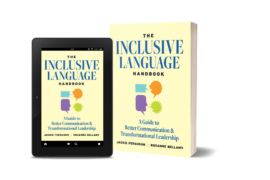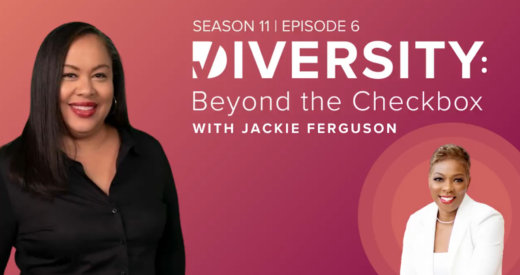Diversity, equity, and inclusion (DEI) is a business imperative for all organizations that want to remain relevant, viable, and competitive in the modern market. Yet when we think about diversity and inclusion, what often springs to mind is people of diverse racial and ethnic backgrounds, gender identities, or sexualities. What’s often overlooked, especially in America, is social class or socioeconomic origin.
Certainly, social class can be an uncomfortable subject, but effective DEI work requires that we get comfortable with uncomfortable topics and seek to understand the ways that social class can and does impact the workplace. What’s clear from research is that employees from lower social class origins tend to carry certain traits and strengths that are of great value in leadership.
Unfortunately, many of these employees are excluded from advancements and promotions or face discrimination in hiring and recruitment, seemingly because of unconscious bias triggered by cultural differences. In other common cases, these employees report feeling treated unfairly or underappreciated compared to their colleagues and, therefore, decide to leave their jobs and find new ones. This turnover can be costly and frustrating and robs your organization of the diversity of thought that comes along with social class diversity.
In fact, workers from lower social class origins are more likely to be humble, empathetic, growth-minded, and open to change. Research also shows that a lack of privilege — often correlated with lower social class origins — leads people to be less self-centered and more willing to acknowledge and learn from mistakes. These characteristics provide tremendous value and effectiveness as a leader.
By including people from all social classes in all levels of leadership, companies can more accurately represent the vast perspectives of their entire staff, leading to a more equitable work environment with higher productivity, employee engagement, and better business outcomes overall.
However, despite these benefits, social class diversity is often lacking in executive positions and even middle management. One of the reasons for this absence may be class-based unconscious bias. Employees who come from lower class origins are often stereotyped as unintelligent, incompetent, or a poor cultural fit for leadership. Additionally, some employers and managers may unconsciously assume that working class employees are less dedicated to career ambitions.
These biases, whether conscious or not, prevent a number of working class employees from landing or advancing to management positions. Yet, research shows that they are entirely untrue. Employees from lower social class origins are equally intelligent, driven, and hard-working, while possibly showing more capacity for empathy and growth.
Homogeneity plays a part in the problem as well, as hiring managers may unconsciously lean toward job candidates who seem like they are “good cultural fits” and share similarities with the rest of the team. This is known as affinity bias: a preference toward people who seem similar to yourself based on things like hobbies, interests, or even clothing style.
In fact, looking for someone who’s a “good cultural fit” can negatively impact your company’s DEI efforts. Instead, try to assess if someone could be a “good cultural addition,” by adding their unique perspective, experience, or thinking style to your current mix of employees. Avoid questions such as “what do you do for fun outside of work?” and focus on their capacity to perform the job at-hand. These types of interview questions are often not intended to intentionally discriminate but, rather, as a friendly way to converse with job candidates. However, they can significantly contribute to unconscious bias in the hiring process and often have nothing to do with the person’s ability to perform a job.
One other way to reduce recruitment bias is to diversify where you seek job candidates. Use multiple job boards to find more diverse employees, instead of relying on referrals and connections from existing staff members. People tend to socialize with other people who are like them, and so referrals can often contribute to homogeneity.
It is important to note the intersectionality of identities here as well and the way that gender and race identities can contribute additional forms of disadvantage. To put it plainly, BIPOC (Black, Indigenous, and People of Color) workers experience more discrimination than White employees who are also from lower class origins. The same is true for women, transgender, and gender non-conforming folks when compared to cisgender men. When race and gender intersect with social class background, there are simply more barriers and biases to overcome.
In sum, although employees from lower social class origins may have different working styles than employees from higher socioeconomic classes, those differences do not impact their capacity and abilities for excellence. Excluding those workers from paths to advancement toward executive and middle management roles will negatively impact your company’s bottom line and weaken both your organizational structure and team environment.
So, how do you make sure that you are fostering strong social class diversity in your workplace?
To start, include this issue in your conversations about diversity, fair hiring practices, and workplace culture. Learn what you can to mitigate Unconscious Bias especially in recruitment, hiring, and promotion. Extend your hiring efforts beyond personal referrals, explore diverse job boards, and use talent recruitment tools that help to find diverse candidates. During interviews, focus less on shared interests and more on the additional value that employees from diverse economic backgrounds will bring to your team. To get more employees promoted to leadership, create career mentorship and professional development programs that provide the necessary skills and expertise needed for success. Following these practices can help you make progress toward greater social class inclusion and add great benefit to your business or organization.
Noreen Quadir is a content writer, with a background in social activism and a passion in advocating for diversity, inclusion, and equity. She writes for online blogs and publications, social media, and websites.






